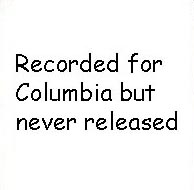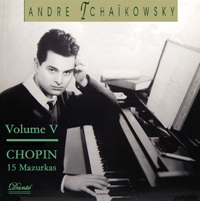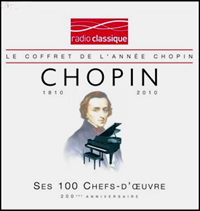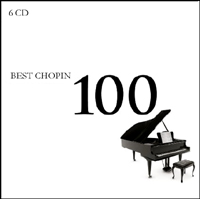|

Columbia Cover Art (none)

Danté Release (1997)

Amazon
Store France (2010)

Amazon
Store US (2010)

VirginMega
Store (2010)
|
Recorded
for Columbia Records (EMI Pathé Marconi)
2YLA-1822/1823
- Never Released
Released - Danté Records, HPC060 - Vol 5
Chopin - Mazurkas
Music/MP3
Chopin
Mazurkas
1. Mazurka,
Op. 50, No.1 in Sol Majeur
01_chopin_mazurka_op_50_no_1.mp3
2. Mazurka, Op. 50, No.2 in la Bémol Majeur
02_chopin_mazurka_op_50_no_2.mp3
3. Mazurka, Op. 50, No.3 in Do Dièse Mineur
03_chopin_mazurka_op_50_no_3.mp3
4. Mazurka, Op. 56, No.1 in Si Majeur
04_chopin_mazurka_op_56_no_1.mp3
5. Mazurka, Op. 56, No.2 in Do Majeur
05_chopin_mazurka_op_56_no_2.mp3
6. Mazurka, Op. 56, No.3 in Do Mineur
06_chopin_mazurka_op_56_no_3.mp3
7. Mazurka, Op. 59, No.1 in La Mineur
07_chopin_mazurka_op_59_no_1.mp3
8. Mazurka, Op. 59, No.2 in La Bémol Majeur
08_chopin_mazurka_op_59_no_2.mp3
9. Mazurka, Op. 59, No.3 in Fa Dièse Mineur
09_chopin_mazurka_op_59_no_3.mp3
10. Mazurka, Op. 63, No.1 in Si Majeur
10_chopin_mazurka_op_63_no_1.mp3
11. Mazurka, Op. 63, No.2 in Fa Mineur
11_chopin_mazurka_op_63_no_2.mp3
12. Mazurka, Op. 63, No.3 in Do Dièse Mineur
12_chopin_mazurka_op_63_no_3.mp3
13. Mazurka, Op. 67, No. 2 in G minor
13_chopin_mazurka_op_67_no_2.mp3
14. Mazurka, Op. 68, No. 4 in F minor
14_chopin_mazurka_op_68_no_4.mp3
15. Mazurka, in A minor ("à Émile Gaillard")
15_chopin_mazurka_gaillard.mp3
Recording
Date(s)
January 18 and 19, and May 22, 1967
Recording
Location
Salle Wagram, Paris, France
Release
Date
June, 1997 by Danté Recordings
Known
Details
This was going to be a two (2) disk set of the complete Chopin Mazurkas
as Columbia
2YLA-1822/1823. The initial recordings for this disk were made in 1967
and when Columbia was unable to bring André Tchaikowsky back
to the recording studio to finish the Mazurka project (after waiting
4 years), and when André himself rejected what was already recorded,
this project was canceled. Fortunately, the Mazurka recording sessions
were saved and Danté was able to (finally) release the Mazurka
recordings in 1997.
Mazuraks
Re-release
In honor of the 200th anniversary of Chopin's birth (1810-2010), in
2010 EMI put together a six (6) Compact Disc (CD) boxed set (coffret
in French) of Chopin's Best 100 Compositions. Nine of the 100 compositions
in this CD set feature André Tchaikowsky as pianist, playing
Mazurkas Opus 50, No. 1, 2 and 3 (CD 2, bands 12, 13, and 14), then
Mazurkas Opus 59, No. 1, 2, and 3 (CD 5, bands 4, 5, and 6), and finally
Mazurkas Opus 63, No. 1, 2 and 3 (CD 6, bands 9, 10, and 11).
This
CD boxed set is available from US and French Amazon online store websites
(and probably others) and also as mp3 downloads from the Virgin Megastore
website. Of course, the Mazurkas played by André Tchaikowsky
are available on this website (above), however, here is the information
regarding this EMI release of Chopin's Best 100 Compositions. Note that
the www.amazon.fr and www.virginmega.fr links (below) include some (but
not all) artist information and music samples.
Amazon
Online Store in France - Click
Here for the www.amazon.fr link.
Amazon
Online Store in USA - Click
Here for the www.amazon.com link.
Virgin
Megastore in France - Click
Here for the www.virginmega.fr link.
Mazurkas
Review
The following is an Amazon.com online review of the Danté Mazurka
CD by Neils Einstein:
In the
1960s, André Tchaikowsky made several recordings for Pathé
Marconi in Paris - including a sensational Goldberg Variations which
won a Grand Prix du Disque.
This
Mazurka record was part of a project for André to record the
complete Mazurkas. He would terminate a recording session of, say,
Mozart or Schubert by playing whatever Mazurkas he felt inspired to
play at that moment.
André
never finished the project, but what we have here on this CD are some
of the Mazurkas he recorded in that period. They are performances
full of poetry, spontaneity and the kind of insight that only a composer
can have into the mind of another. This is great music making.
Everyone
I have played the CD to has been enchanted by it. This is a record
that no lover of Chopin or of great piano playing should be without.
The following
excerpts are from the book The Other Tchaikowsky, available for
free as a pdf file on this website (Click
Here). These excerpts tell something of André's life at the
time the Mazurka recording sessions took place in 1967.
Royal
Festival Hall (1967)
Between
these recording dates of January and May, 1967, André was selected
as the first pianist to play in the new Queen Elizabeth Hall in London
on March 3rd, 1967. He played a single work, Piano Sonata in B-flat
(D.960) by Schubert. Minutes before he was to appear on stage, he inadvertently
locked himself in the bathroom. No amount of fiddling could open the
door from either side. Expert help was required. Workmen were called
and the entire door, hinges and all, had to be removed so André
could take the stage. Of André's performance, the music critic
Max Loppert of the Financial Times wrote:
If future
concerts in the new Queen Elizabeth Hall are able to provide the same
degree of freshness, both in choices of works and in the manner of
their performances, as did last night's, it will be an incalculable
addition to London's musical life. Of course the outstanding soloist,
André Tchaikowsky, was largely responsible for this impression.
One wonders
how many excellent performances on stage conceal near disasters that
transpire out of sight of audiences.
André
and Eve Harrison (1967)
André
was getting along well with Terry Harrison, his manager at Ibbs and
Tillett. Terry worked with André as best he could. André
would give him blocks of time and asked for concerts only during these
blocks, not the easiest arrangement for a manager. Terry felt close
enough to André to ask a favor. He had separated from his wife
Eve and asked André if he would occasionally give her a ring
on the telephone. Terry Harrison:
"In
1967 my wife Eve and I separated, but André only knew her a
little bit. As he had become my close friend by 1967, I asked him
if he would occasionally give her a ring. He said, 'Yes, although
she is not particularly my type of person.' Eve was rather English,
rather quiet, and at that time not so interested in music. André
rang her and took her out to dinner. About the 2nd or 3rd time he
saw her, he thought she was rather nice. They slowly became very good
friends. André had no romantic interest in it, but it was a
friendship that gradually grew. At that time, André lived in
London and Eve saw André maybe two or three times a month.
André used to like to go to the theater, for instance, so he'd
invite Eve. Eve was also quite interested in theater and drama."
As the
summer of 1967 approached, André decided once again to attend
Dartington Summer School. As in past summers, he met interesting musicians.
On this occasion, he met the members of the very fine Lindsay String
Quartet and promised to write something for them. Members Peter Cropper
and Bernard Gregor-Smith recall their meeting:
"As
a young quartet, we were playing at Dartington Summer School in Devon.
It was our last year of being students, which would have been 1967.
The Amadeus Quartet was supposed to be playing, but one of them was
ill, so we were asked to provide some music. We played the Bart6k
String Quartet No.3. André was going to play just before us.
As he was due to go on stage, André couldn't be found. No one
could find him. The audience was waiting. They found him in the 100
[bathroom] and he shot straight out of the 100, onto the stage and
started playing before they even had time to applaud his appearance.
That was our first meeting. André did not show the greatest
respect for his audiences in some ways.
"We
played with André quite a few times. We did a broadcast on
the BBC of the Fauré G minor piano quintet at St. John Smith
Square in London. We all think that somehow it is different playing
with a composer. We've never experienced anything quite like it since.
It was almost like he was making it up, searching for a fresh approach
to playing, almost delighting in every single nuance. It was like
he was composing it himself, as if extemporizing.
"He
had a tremendous intellect. Genius. Reading Russian literature in
Russian. In my house once [Bernard Gregor-Smith speaking at this point],
he immediately sat down with the biography of Bertrand Russell and
started to read it and sat there for two days, reading non-stop.
"He
had this great bag of pills. He took strong sleeping pills to put
him asleep, then pills in the morning to wake him up. He was rattling
around and a definite hypochondriac, a classic case.
"In
Portsmouth we were rehearsing a Brahms piano quintet. André
said he was sorry that he had little time to practice it, but to run
through it anyway. The performance was the next day. We played through
the first movement and at the end, I realized that he hadn't turned
a page. We then took a break and he asked what was on the rest of
the program? We said the Beethoven Opus 95 quartet. André then
sat down at the piano and played the first movement of the string
quartet, playing all four string parts from memory. His memory was
fantastic. When we played bridge, he was as incredible as a master
bridge player, remembering all the cards, giving you the impression
that he knew what was in your hand."
André
eventually wrote two string quartets that were given world premieres
by the Lindsay Quartet, with the second dedicated to the Quartet.
|




